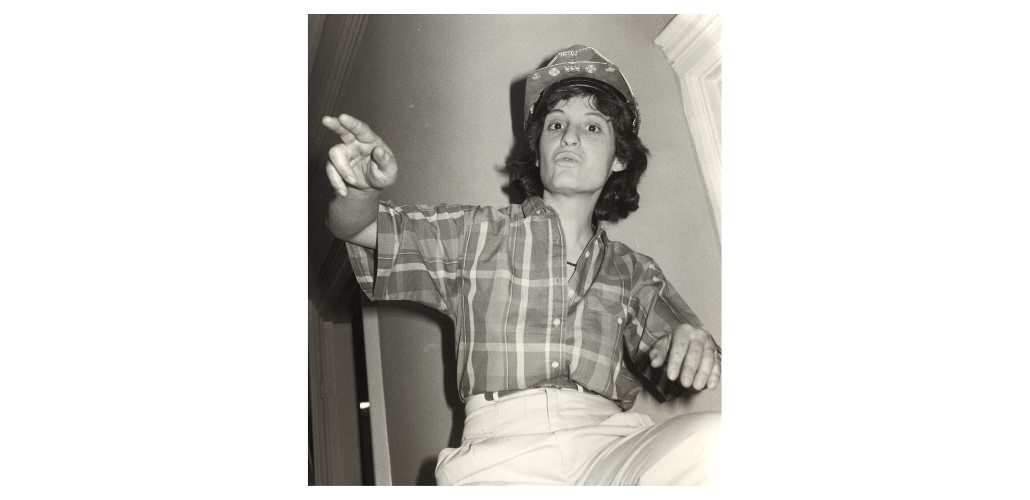Seeking Today’s Workplace Poets

Susan Eisenberg used to give readings of her It's a Good Thing I'm Not Macho poems sitting atop a four-foot ladder, wearing a diamond hardhat, an image from the poem "Hanging In, Solo."
Almost Killed Myself: Day One, Apprentice Electrician
He needed an extra pair of hands for the day.
Set me up at a wire rack and explained
how to feed a snake — wires already-taped —
through a pipe. At the pipe run’s other end
he’d pull them in. Feed and pull. Simple.
Then left the room.
Rather than wait for him to shout, Go!
as instructed,
I decided to show I was a go-getter
and began to feed the metal snake
through the metal pipe.
On his way he must have heard
metal traveling through metal
toward the live electric panel —
bellowed a thunderous, STOP!!!
reappeared crimson-faced — defined for me :
chain-of-command live voltage.
I had the good fortune, in the mid-1970s, to be invited into a creative writing class as an audit student—my introduction to the craft of engaged poetry. A few years later, in 1978, federal affirmative action opened construction jobs and apprenticeships to women, and I entered Electrical Workers (IBEW) Local 103’s apprenticeship, in what would become their first class to graduate women—five of us.
As I learned the electrical trade in what was too often a hostile workplace, poetry became my life raft. Poems written during my apprenticeship formed my first book, It’s a Good Thing I’m Not Macho. The poems always ended upbeat, expressing what I could acknowledge at the time: the thrill of learning a craft, the drama of a construction site, the solidarity of the women as we broke new ground. As to the dangers sometimes laid in my path by those responsible for my safety: nothing I can’t handle.
I thought the Macho poems reflected just my own personal experience. But when I got a note from a plumber in Wisconsin and tradeswomen elsewhere, I learned that across trades and across the country, our experiences were of one cloth.

SUPPORT LABOR NOTES
BECOME A MONTHLY DONOR
Give $10 a month or more and get our "Fight the Boss, Build the Union" T-shirt.
I was surprised to get a letter from a Canadian poet, Tom Wayman, inviting me to Vancouver to participate in the Split Shift Conference: A Colloquium on the New Work Writing, organized by the Vancouver Industrial Writers’ Union. In 1986, I had no idea there was such a thing as “work writing”—old or new—but my suitcase was packed by the time I finished his letter. The idea was that, rather than outsiders’ observations, readers should hear workers themselves writing from inside their job experience.
Eighteen poets—half Americans, half Canadians—read poems about our work: in the airline industry, construction, clerical, farm work, teaching. We included a longshoreman, a factory worker, a logger, a doctor, a railroader, and a few collective members from a San Francisco-based magazine, Processed World, that sought to “end the silence surrounding the underside of the Information Age … [and] serve as a forum for the dissidents and malcontents of the modern office. . . [where] much of the work we do is useless to us, and of no social value in itself.” They took issue with the exuberant pride and positivity of my poems!
I heard their point when it was voiced by a woman who’d been forced out of the San Francisco Fire Department. She came up after I gave a reading in the Bay Area and said, “If it was as positive as you make it sound, I’d still be a firefighter.” Her challenge opened floodgates. I went home and wrote the title poem of my next book, Pioneering. The blunt feedback of tradeswomen holding me to account has been my second apprenticeship: as a writer.
Fast forwarding a few decades—I’m now Poetry Editor of Labor, the official journal of the Labor and Working Class History Association. I thought I’d reach out to Labor Notes readers because I find myself looking for this moment’s New Work Writing. Embedded poets who’ve been reflecting on the changes in their workplace due to Covid, A.I., the global economy; on their newly unionized workplace or newly invigorated union or the consequences when a union drive fails; or on the interactions of home and work.
Two Poetry Venues
Labor: Studies in Working Class History is published quarterly. Each issue opens with Common Verse, a feature initiated by the journal’s first Poetry Editor, Jim Daniels. We can only publish four poems per year, but I like to think they set up a conversation among themselves over time, as well as with the articles that follow. If you’d like to submit, email poems as a pdf attachment to labor[at]georgetown[dot]edu. Put Poetry in the Subject Line. Please send only unpublished poems.
Labor Heritage Foundation’s weekly newsletter —able to publish 52 poems/year and with a quicker turnaround—reaches several thousand readers. Email poems to Executive Director Chris Garlock at info[at]laborheritage[dot]org, with Poetry in the Subject Line. Here, either published or unpublished is fine; shorter is best, but if it's longer and posted online, they can excerpt and link to the complete poem. Subscribe here (click the "subscribe" button in the upper left).
Registered participants in this year's Great Labor Arts Exchange/Labor Notes Conference can also enter the poem contest, to be held live at the conference on April 19.
Susan Eisenberg's website is susaneisenberg.com. View her digital art installation, On Equal Terms, at here.





